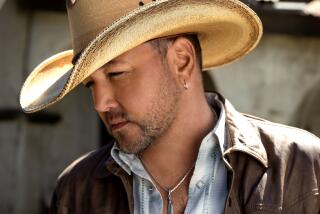Nashville Sound: Jingling Cash Registers
- Share via
NASHVILLE, Tenn. — Country music has taken a tumble in popularity since the urban cowboy was riding high several years ago, but you could not tell it by walking the streets of this hillbilly heaven.
Drawn like pilgrims to a religious shrine, fans come by the millions each year to view the homes and possessions of their favorite stars or attend a live performance at the Grand Ole Opry, the Carnegie Hall of country.
People like Bernard Murray from Bayonne, N.J., a city rimmed by oil company storage tanks in the shadow of the Statue of Liberty. Murray, like Barbara Mandrell, was country when country wasn’t cool. But it took him 37 years to finally get to Nashville.
“This has been my greatest dream,” said the 63-year-old retired factory worker, collecting souvenirs in the shops along famous Music Row.
Nashville’s record companies keep sales figures confidential, but country music’s share of the record market has declined to about 10% from a high of about 20% about five years ago after the release of “Urban Cowboy.”
Nonetheless, more than 7 million tourists visit Music City and spend more than $600 million each year, according to the Chamber of Commerce. The Opryland theme park, home of the Grand Ole Opry in recent years, attracted 2.4 million visitors in 1985 alone.
About 80% of the visitors come to witness country music, be it at the Grand Ole Opry ($8-$10 per ticket), Opryland theme park ($13.95 for a three-day pass), or George Jones’ car collection ($3) on Music Row, said Terry Clements, the chamber’s director of tourism.
Five dollars gets a tourist into Johnny Cash’s museum to see the marble collection of the star’s son, or entrance to Mandrell Country, where Barbara Mandrell’s honeymoon nightgown and first mink coat are on display.
At Twitty City, Conway Twitty’s estate, it costs $5.50 to view miniature replicas of the entertainer’s first home and his touring buses.
Things have come a long way in the 60 years since the days of a small-town radio show bringing the hillbilly sound crackling into the nation’s living rooms. Humble singers, guitarists and fiddlers have catapulted to stardom.
But in a nation where pop sensations are made--and broken--overnight, the country music industry is an anomaly.
“The short course in that is, the lyrics of country music address everyday life,” said Tom Adkinson, a spokesman for Opryland USA.
More to Read
Sign up for The Wild
We’ll help you find the best places to hike, bike and run, as well as the perfect silent spots for meditation and yoga.
You may occasionally receive promotional content from the Los Angeles Times.






